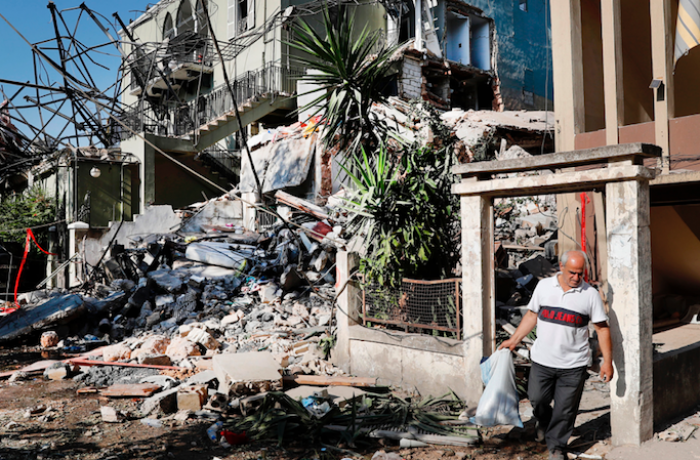The world embraces Beirut, ending Lebanon’s isolation
August fourth’ horrific explosions, which hit half of Lebanon’s capital, took place in a country hitherto under regional and global isolation with a government scorned by the international community, suffering from rampant corruption, the COVID-19 pandemic, and the effects of the embargo on Syria.
Aug 08, 2020

By Pierre Balanian
August fourth’ horrific explosions, which hit half of Lebanon’s capital, took place in a country hitherto under regional and global isolation with a government scorned by the international community, suffering from rampant corruption, the COVID-19 pandemic, and the effects of the embargo on Syria.
With the Port of Beirut, one of the most active and biggest in the Mediterranean since antiquity, knocked out, things are far worse. In Beirut, no one expected help from abroad. After the initial shock, the Lebanese pulled up their sleeves, almost in desperation, with few means but a lot of good will.
Hundreds of thousands of people flocked to clinics to donate blood. Families in the poorer northern and southern areas opened their homes to the 300,000 people left homeless. Young people of all backgrounds volunteered to help clear the debris, pick up broken glass and move the wrecked cars from the streets.
The blast, now called Beirutshima, which had about one tenth of the explosive power of the atomic bomb dropped on Hiroshima, now seems to have broken Lebanon’s isolation.
International solidarity has come, including from Israel, the “enemy”. Hitherto, world opinion had seemed impervious to the fate of the people of Lebanon, wounded by the policies and wars of others. Now messages of solidarity and closeness have come from all over the world accompanied by actual offers of much needed help.
For the Lebanese, this is a relief; for humanity, this brings hope: Despite the world crisis, human beings continue to see themselves as one family. Since yesterday afternoon, Beirut airport has been very busy as aid pours in from all over the world.
Russia has already sent three planes loads full of medical supplies, plus a field lab for COVID-19 patients; a team of Russian SAR experts is scheduled to arrive Aug 6. Italy has sent a group of firefighters, while Great Britain has donated £5 million (RM27.5 million) to repair houses damaged by the explosions. China has offered to rebuild the port in record time.
The nightmare is providing a unique opportunity for the country to recover and save itself from taking geopolitical sides in today’s highlight polarised world.
In solidarity with the people of Lebanon, French President Macron arrived at noon Aug 6 (Beirut time) on an official visit, the first by a head of state of a friendly country, breaking an informal embargo that has been in place for almost a year now. Three planes full of aid also landed with the French president.
Meanwhile, digging continues for victims still under the rubble. The death toll reached 137 this morning whilst the number of the injured topped 5,000. The authorities have ordered three days of national mourning, and imposed a two-week state of emergency enforced by the Armed Forces.
Syria, already reeling from its own civil war, also sent aid, and its foreign minister said that it would not abandon Lebanon. The civil protection agency in Lebanon’s Palestinian refugee camps has also been busy, helping rescue a member of Lebanon’s own civil protection agency trapped in the rubble.
Planes carrying aid are a sign of unprecedented international solidarity with the Mideastern country.
The first aircraft landed at 6 pm yesterday, from Iran, followed by planes from Russia, the United Arab Emirates, Kuwait, Qatar (two field hospitals), and Egypt. Tunisia evacuated about a hundred seriously injured people to be treated at a military hospital in Tunis. Eventually, a plane with aid arrived from the United Kingdom.
A cargo ship is on its way to Beirut from Algeria, with three Algerian planes bringing food set to land soon. Turkey has sent medicines; Iraq is providing fuel needed to provide electrical power to the whole country for several months.
After the first 24 hours, it is clear that Lebanon cannot cope with such a tragedy on its own, that the disaster’s scope far outstrips the capacity of a country already on its knees.
More aid is on the way, but the needs are huge. Beirut’s central districts seem to have been hit by some cataclysm, a tsunami or a horrific earthquake. The air in the capital is laden with poison whose residue can be seen on cars.––Asia News







Total Comments:0